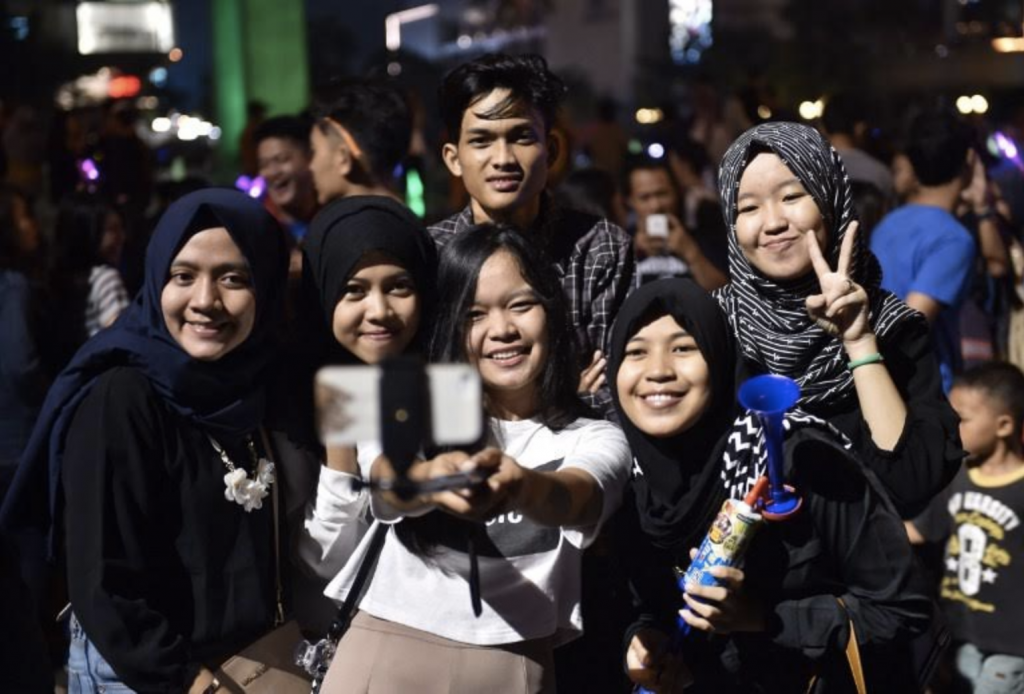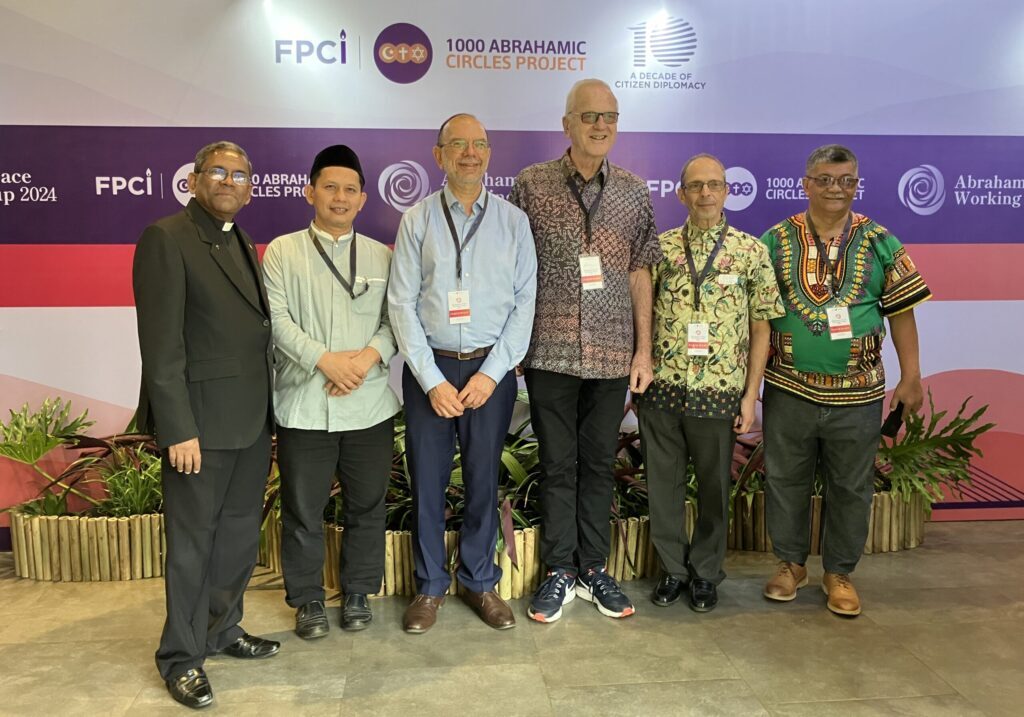Australia/Israel Review
Young people shake up Indonesia’s election
Feb 28, 2019 | Giora Eliraz

On April 17, Indonesia will mark a new milestone in the distinctive democratic path it started out upon in 1998, holding a “mega-election” for both the presidency and legislatures on both the national and local levels. More than 190 million Indonesians are eligible to vote.
Young people constitute a large element of this electorate – the population aged from 17 to 35 years (the minimum voting age is 17) represents more than half of all potential voters. But in the previous presidential and parliamentary elections of 2014, high percentages of those under 30 years of age didn’t exercise their right to vote.
This reflects to a certain degree a global trend of decreasing voter turnout in democracies over recent decades, with young people in particular tending to exercise their democratic right to vote less than their older compatriots. It’s also likely that the relatively low voter turnout among young people reflects, among other things, a disillusionment with politics that is too often connected with corruption, scandals and intrigue.
Perhaps this tendency is also sustained in Indonesia, as in other parts of the world, by the increasing number of “netizens” who are immersed in the “bubble” of social media much more than in the “real” outside world. Young Indonesians might also add sarcastically “We have seen this movie before” – in 2014, it was the exact same two contenders for the presidency, the incumbent President Joko Widodo (Jokowi) and the former army general Prabowo Subianto, who faced each other in the runoff presidential elections.
In this context of growing revulsion and cynicism among young Indonesians toward politics and mistrust of the political establishment, last December some tech-savvy Indonesian youth launched a fictitious political campaign which quickly went viral through the support of hundreds of thousands of Indonesian “netizens”.
The initiators, working as a team even though located in different cities across the huge Indonesian archipelago, produced a large-scale virtual political campaign for a pair of fictional candidates for the Presidency – Nurhadi, who is “running” for the presidency and Aldo, his running mate for vice president. In other words, in addition to the two real contesting campaigns of Jokowi and his running mate Dr. K.H. Ma’ruf Amin, and Prabowo and his running mate Sandiaga Salahuddin Uno, young people have presented a third pair, Nurhadi-Aldo, who have gotten considerable attention even though they do not actually exist.

The parody “Nurhadi-Aldo” presidential ticket
Visually, this virtual campaign copies some significant characteristics of a real Indonesian presidential campaign: the design of the virtual “campaign” posters feature standard elements of political races in Indonesia, including the logo of their party, Partai Untuk Kebutuhan Iman (“Party For Faith Needs”), while their images reflect a solid appearance of middle-aged Muslim men, wearing traditional koko shirts and peci black headdresses.
In posters distributed online the fictional pair also appear alongside the real contenders, so that strangers coming across them might think the two are real candidates.
But if one looks at the detail, the similarities with real political life quickly disappear. Even the logo of their fictional party is somewhat satirical, not to mention that the claims and slogans of the fictional campaign contain large doses of humour, much of it rude or with sexual overtones. For instance, one key slogan is “Dildo for Indonesia” – with “dildo” supposedly being a combination of Nurhadi and Aldo.
Whereas the campaign’s originators have sought to keep a relatively low personal profile, the two real people whose portraits are used for portraying the two fictional figures, especially the person behind the “presidential candidate”, appear to be enjoying the spotlight. Nurhadi, who effectively portrays a very authoritative character in the fictional campaign, is actually a masseur and herbal juice seller in real life.
Most Indonesian netizens likely consider the fictional political race as entertainment – a good comic show that provides a refreshing breeze to chill the political heat. But is it really just entertainment? According to the administrators of this virtual political campaign, they are actually seeking to send a critical message to the government and Indonesia’s politicians in general, as well as a warning to the Indonesian people to beware of politicians who stimulate division, hostility and strife within society. Risque insinuations, featured in the fictional campaign, are used as a marketing strategy to attract attention and enable the posts to go viral.
Will this phenomenon encourage political participation among young Indonesians and send them in greater numbers to the ballot boxes? The answer seems likely to be no. It might even create an illusion of political involvement to a degree that the “virtual political experience” helps make real political engagement redundant.
Yet there is enough ground to wonder if such a satirical, fictional presidential race offers an effective option for young Indonesians who are fed up with “old politics” yet hope for social change within the existing democratic context. Perhaps a more substantial option for real political participation for Indonesia’s young people could be a relatively new party, the Indonesian Solidarity Party (Partai Solidaritas Indonesia, PSI). This refreshing political grouping, which targets its messages mainly at young people and is therefore often dubbed the “millennials party”, was formed after the elections of 2014 and will participate for the first time in the general elections this year.

The PSI party’s Grace Natalie: A new face in Indonesian politics
The PSI party, which to date has gotten little attention outside Indonesia, is largely identified with its founder and leader, Grace Natalie. Only 36 years of age and a former journalist, Natalie has shown strong political skills and is campaigning on a program of striving to make Indonesian society a better place, in particular for its young people, by fighting for tolerance, justice and equality. Thus, she has been a determined opponent of the local sharia-inspired regulations and bylaws which have been implemented in many districts and which have been criticised for threatening pluralism, democratic freedom and the rights of women and minorities in Indonesia.
If the presidential contest this time around looks like a repeat of the 2014 election, one reason to pay close attention to the results of Indonesia’s April poll is to follow the electoral fortunes of the PSI. If the party succeeds in gaining a substantial foothold, the implications may be greater than its immediate political numbers in Indonesia’s parliament would indicate.
Dr. Giora Eliraz is an affiliate instructor at the Jackson School of International Studies at the University of Washington in Seattle; a research associate at the Harry S. Truman Institute for the Advancement of Peace at the Hebrew University in Jerusalem; and a research associate at the Forum for Regional Thinking (FORTH).
Tags: Indonesia






